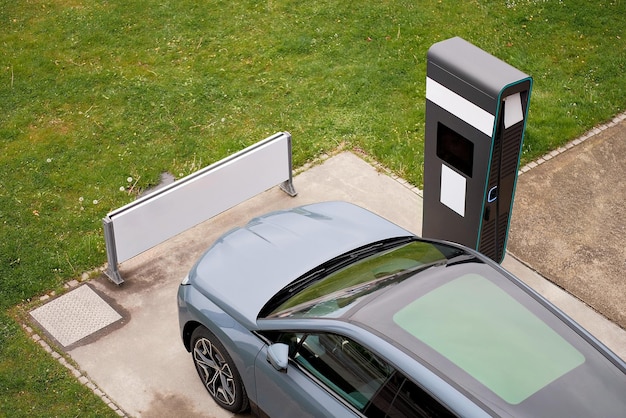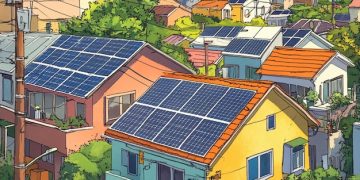Maximize Fuel Efficiency: Sustainable Transportation & Emission Reduction

Sustainable transportation focuses on strategies to maximize fuel efficiency and reduce emissions by 12% by adopting eco-friendly driving habits, maintaining vehicles, using alternative fuels, and investing in fuel-efficient technologies.
In today’s world, creating a greener future and practicing sustainable living is essential. One significant way to achieve this is through sustainable transportation by learning how to maximize fuel efficiency and reduce emissions by 12%. These actions can help to mitigate environmental impacts and conserve resources, and save you money on fuel costs.
Understanding Sustainable Transportation
Sustainable transportation involves any means of transport that does not deplete natural resources. It aims to reduce environmental and social impacts while supporting economic growth.
What is Sustainable Transportation?
Sustainable transportation encompasses various practices focused on reducing the carbon footprint of travel.
Why is it Important?
It’s crucial for several reasons, including environmental protection, economic savings, and public health.
Adopting greener transportation methods can:
- Reduce air pollution.
- Decrease greenhouse gas emissions.
- Conserve non-renewable resources.
By understanding and adopting sustainable choices, we can contribute to a healthier planet.

Ultimately, recognizing the importance of sustainable transportation is the first step in making a difference.
Eco-Friendly Driving Habits
Adopting eco-friendly driving habits is one of the most straightforward ways to maximize fuel efficiency and reduce emissions by 12%. These practices not only diminish environmental impacts but also enhance safety and save money.
Smooth Acceleration and Braking
Avoid rapid acceleration and hard braking, which can significantly increase fuel consumption.
Maintain a Steady Speed
Try to maintain a consistent speed, especially on highways, to conserve fuel.
Effective driving practices include:
- Using cruise control on long drives.
- Anticipating traffic flow to avoid sudden stops.
- Accelerating gently from a standstill.
By integrating these simple habits into our daily routines, we can make a substantial impact on fuel efficiency and emissions reduction.
Incorporating these measures into your driving routine can significantly contribute to sustainable transportation.
Regular Vehicle Maintenance
Consistent vehicle maintenance is vital for optimizing fuel efficiency and minimizing emissions. Well-maintained cars run smoother, are safer, and contribute less to environmental pollution.
Tire Inflation
Ensure that your tires are properly inflated to the recommended pressure. Underinflated tires increase rolling resistance and fuel consumption.
Engine Tune-Ups
Regular engine tune-ups, including spark plug replacement and filter changes, improve engine performance and reduce emissions.

Essential Maintenance includes:
- Checking and changing oil regularly.
- Maintaining proper tire alignment.
- Ensuring all fluids are at the correct levels.
- Regularly inspecting and replacing filters.
Consistent maintenance not only reduces emissions by maximize fuel efficiency and reduce emissions by 12% but also extends the lifespan of your vehicle.
Using Alternative Fuels
Transitioning to alternative fuels is a significant step toward sustainable transportation. These fuels offer cleaner and greener alternatives to traditional gasoline and diesel.
Biofuels
Biofuels, made from renewable sources like corn, soybeans, and algae, reduce greenhouse gas emissions.
Electric Vehicles (EVs)
Electric vehicles offer zero tailpipe emissions and can be powered by renewable energy sources.
Exploring alternative fuel options supports:
- Reduced reliance on fossil fuels.
- Lower carbon footprint.
- Innovation in renewable energy technologies.
By investing in and advocating for alternative fuels, we can drive cleaner and maximize fuel efficiency and reduce emissions by 12% and greener transportation.
The shift to alternative fuels paves the way for a more sustainable future.
Investing in Fuel-Efficient Vehicles
Choosing fuel-efficient vehicles is a direct way to significantly reduce your carbon footprint. These vehicles are designed to maximize fuel efficiency and reduce emissions by 12%, helping you save money and protect the environment.
Hybrid Cars
Hybrid cars combine an internal combustion engine with an electric motor, offering better fuel economy than traditional cars.
Electric Cars
Electric cars run solely on electricity, emitting no tailpipe pollutants.
Benefits of fuel-efficient vehicles include:
- Lower fuel costs.
- Reduced emissions.
- Potential government incentives and tax credits.
When making your next vehicle purchase, consider a fuel-efficient option to support sustainability.
Switching to a fuel-efficient vehicle is an investment in a cleaner, more sustainable future.
Planning Efficient Routes and Reducing Trips
Effective route planning and reducing unnecessary trips can substantially maximize fuel efficiency and reduce emissions by 12%. By combining errands, using public transportation, and choosing the most efficient routes, we minimize our carbon footprint.
Combine Errands
Plan your trips to combine multiple errands into a single journey, reducing the overall distance traveled.
Use Public Transportation
Opt for public transportation, such as buses, trains, and subways, whenever possible to reduce individual vehicle emissions.
Strategic planning leads to:
- Reduced fuel consumption.
- Less traffic congestion.
- Cost savings.
By making thoughtful transportation choices, we can contribute to a more sustainable lifestyle.
Strategic route planning and trip reduction are key elements of sustainable transportation.
| Key Point | Brief Description |
|---|---|
| 🌿 Eco-Driving | Smooth acceleration & steady speeds reduce fuel use. |
| 🛠️ Maintenance | Regular tune-ups & tire checks enhance efficiency. |
| ⛽ Alt Fuels | Biofuels & EVs cut emissions. |
| 🗺️ Route Planning | Efficient routes & fewer trips save fuel. |
FAQ
▼
Sustainable transportation helps reduce air pollution, conserve resources, and lower greenhouse gas emissions. It also supports economic growth and improves public health.
▼
Adopt eco-friendly driving habits such as smooth acceleration and maintaining a steady speed. Proper vehicle maintenance, like tire inflation and engine tune-ups, also helps.
▼
Alternative fuels like biofuels and electricity offer cleaner, greener alternatives to gasoline and diesel. They lower carbon emissions and reduce our dependence on fossil fuels.
▼
Yes, fuel-efficient vehicles reduce emissions and can save you money on fuel costs over time. They also sometimes come with government incentives and tax credits.
▼
Planning efficient routes helps you combine errands and reduce unnecessary trips, minimizing fuel consumption and emissions. Using public transport adds another sustainable layer.
Conclusion
By integrating these strategies, we can significantly maximize fuel efficiency and reduce emissions by 12%, foster a greener environment, and practice responsible sustainable living. Small changes in our daily routines and transportation choices can lead to substantial positive impacts on the planet.





